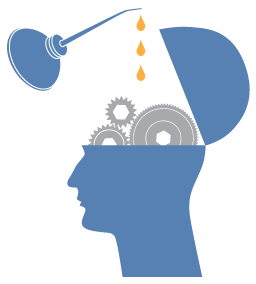What You Should (and Should Not) be Doing to Keep Your Mind Sharp
From doing our daily crossword puzzles to taking vitamin B12 religiously, we all look for ways to keep our  minds sharp and active. But according to an interesting new study done by various organizations including the National Institute on Aging and the Centers for Disease Control and Prevention, some of what we’re doing may not actually be helping us at all. Here’s a look into what the new study says does and does not help prevent mental decline as a result of age.
minds sharp and active. But according to an interesting new study done by various organizations including the National Institute on Aging and the Centers for Disease Control and Prevention, some of what we’re doing may not actually be helping us at all. Here’s a look into what the new study says does and does not help prevent mental decline as a result of age.
What actually works:
Exercise
Cardio, or exercise that raises the heart rate and gets blood flowing to the brain, is especially helpful in keeping your mind young. Combine this with strength training, and you’ll be strengthening your mind and body.
Staying Socially and Intellectually Active
Believe it or not, having daily interactions with others and participating in stimulating conversations is a big part of keeping your mind young. Other activities that challenge your mind – like writing letters or learning new languages - also help preserve brain function throughout the years.
Keep that Heart Healthy
As a general rule of thumb, what’s good for the heart is good for the mind. Things like high blood pressure, high cholesterol and diabetes are linked to cognitive decline later in life. It’s important to note though that lowering blood pressure with medication does seem to help prevent those issues. It’s unclear if the same applies to cholesterol though.
Eat Well
While no one diet has been proven to help brain function, it is true that giving your body the nutrients it needs is an important part of staying healthy — mind, body and soul. Some diets, like the Mediterranean diet, have been shown to improve brain function in studies, but there is conflicting evidence on both sides. So eat well, focus on Omega-3 fatty acids, olive oil and veggies, and your entire body will be impacted in a positive way.
Sleep
Poor sleep quality is linked to everything from Alzheimer’s to a general decline in brain function over the years. A good night’s sleep is an important part of overall brain health. Seek treatment for conditions like sleep apnea to ensure your sleep is restful.
What is not proven to work:
Mind Games
Researchers suggest being leery of games that claim to improve brain function. While it’s possible that users will get better at the games, these skills are not thought to translate to everyday life.
Supplements
There is no real evidence that vitamins of any kind help improve brain health. Despite this, Americans continue to spend over $30 billion a year on supplements.
Vitamin E
While good for other things, vitamin E seems to have no impact on brain health and, when taken in large doses, is linked to a higher risk of death.
Vitamins B6 and B12
Commonly thought to be good for the brain, these vitamins provide absolutely no benefits to older adults who are not folate deficient.
Vitamin D
While a deficiency in vitamin D has been linked to a decline in brain health, taking supplements has not been shown to improve things like memory or motor function. In fact, high levels of vitamin D are linked to attention problems and cognitive impairment.
Sarah Riordan
